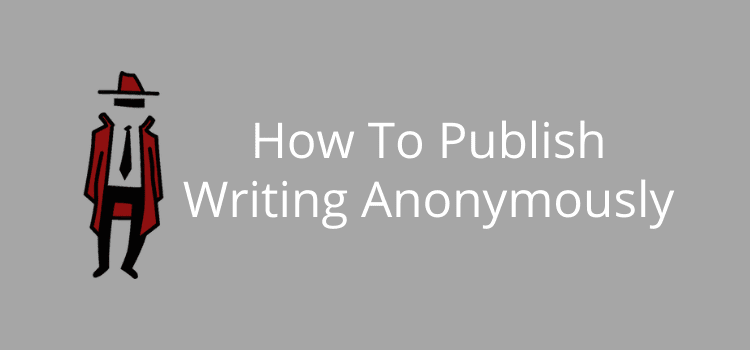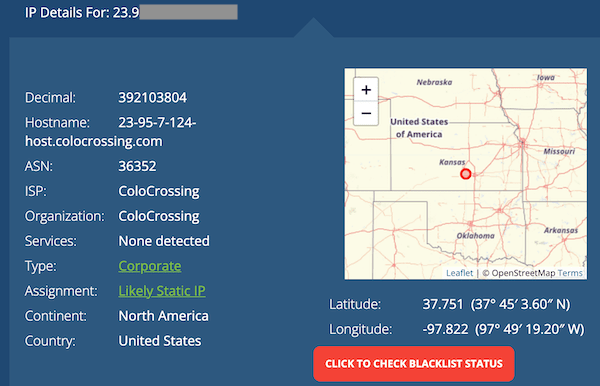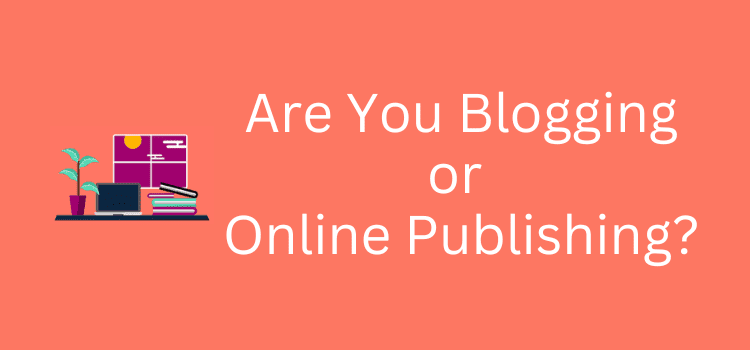
There are many reasons why you might want to publish writing anonymously.
Many famous writers and authors have used pen names or pseudonyms, so it’s nothing new.
However, most writers today publish online, making it more challenging to keep your identity a secret. So how do you publish anonymously?
The internet has made it easy for new writers to find readers. But if you want to publish on the quiet, you need to take care.
How to publish your writing anonymously
There are so many options available to writers and authors to publish their work.
You can choose between self-publishing, online publishing, or article submissions, to name a few.
There is no shortage of sites, platforms, and services.
You can publish novels, nonfiction, short stories, articles, essays, opinion pieces, or poetry.
But how can you publish your writing and keep your real name a secret?
Many writers and authors write under a pen name. But that is not the same as writing anonymously.
John le Carré was a famous author but didn’t hide his identity. His real name was David John Moore Cornwell.
If you want to write anonymously, you don’t want any connection with readers.
So how can you publish your writing but keep your identity and name hidden from view?
Here are some options, ideas, and tips for you.
Self-publish anonymously
Can I publish a book anonymously? Yes. Almost all of the popular self-publishing services allow you to publish under a pen name.
With Amazon KDP, Smashwords, and Draft2digital, it’s relatively easy.
Yes, you need to create an account on these platforms if you want to get paid.
So you will have to provide your personal details.
These will include your legal name, address, and bank details.
You will also need to complete a tax declaration.
But these will not be visible or accessible to anyone apart from you and your service provider.
When you are ready to publish your book or ebook, all you need to do is enter your pen name in the author field.
After your book is published and available for sale, only your pen name will be visible to readers.
Your real name will not appear anywhere.
Some self-publishing platforms allow you to create more than one pen name.
But others require a new account for each new name.
It would be rare that you would need to do this.
But if so, check with your service provider if you want to use multiple pen names.
Preparing for online anonymity

For almost all online writing platforms, you will need to supply an email address.
If you want to keep your identity a secret, don’t use your personal email address.
There are a lot of free email providers, including Gmail, Yahoo, and AOL.
If you already have a Gmail account, it is possible to create additional accounts.
You can add a new address, or another option is to create aliases.
For the best protection, try not to use the same email address on different platforms.
Another use for a new email address is opening a new anonymous Twitter account.
It’s one of the few social media platforms that allow multiple accounts.
You will need to manage your extra email addresses. Check them regularly for notifications from your accounts.
What about your IP address?
Whenever you use the internet, most sites and services will record your IP address.
If you post comments on blogs or websites, the owner can see your IP address.
The most common use is to track and block spammers.

In this case, I can also do a lookup for the IP address and get some basic details.
If I choose to, I can block the IP address and the user from my site.

But as you can see, there are no personal details at all apart from an approximate location.
When you publish your writing anonymously online, your IP address will not expose any of your personal details to everyday users.
However, you should bear in mind that law enforcement agencies may be able to access more details from an IP address in cases of illegal activities.
Anonymous writing sites
If you want to publish an article, opinion, or story without any need for an account, a few sites offer an anonymous writing platform.
There’s no guarantee that you will find readers, but for true anonymity, they might suit you.
I haven’t thoroughly tested the following sites, so I can’t say how effective they are.
Write.as is one of the popular anonymous writing sites on the internet. All you need to do is write and then hit publish.
Notepin.co is another option. You only need a username and password, but giving your email is optional.
Telegra.ph is the last one on my list. Like the others, you can write and publish without giving any details.
Blogging and social media

Even when you publish anonymously or under a pen name, you may want to promote your writing.
If you are self-publishing, marketing and promotion are vital elements in selling books.
But to keep your anonymity, you need to have a plan.
As I mentioned before, Twitter is an ideal platform to use. With a second or even third account, you can promote without exposing your real name.
Facebook is one to avoid, however. It’s not easy to create a second account, and on top of that, there are always data privacy concerns.
Pinterest is a good option, as you can open an account using your pen name or a pseudonym.
If you want to set up a blog, most free blogging platforms allow you to create a site that won’t expose your real name.
Another option is to use Medium, which is one of the most popular sites on the internet.
It’s a favorite platform for writers because it attracts so many readers every day.
You might already have a Medium account, so can you open a new one?
Yes, you can start a new account by using a different email address. Make sure you log out first; then you can set up your new Medium account.
The only minor hassle is that you can’t use both accounts at the same time.
The way around this is to log in using different browsers—perhaps Chrome for your personal accounts and Firefox for your pen name accounts.
Conclusion
With a bit of planning and caution, it’s relatively easy to publish writing anonymously online.
Making sure you don’t use your personal or professional email address is a good start.
But also be careful not to use links to any of your existing social media profiles, such as Facebook, Linkedin, Goodreads, or Twitter.
For writers and authors who already publish under their real names, you need to take even more care.
The best advice is to separate your anonymous writing activities as much as you can. One good way is to use different browsers.
You can use one you already have or download Vivaldi, Microsoft Edge, or Opera.
If you use an existing browser, make sure you clear all cookies and the cache, as well as log-in passwords.
That way, you can start afresh with all the sites and services you will use for your pen name accounts.
So good luck with your anonymous writing, whoever you are.
Related reading: When You Publish Your Writing Online You Can Never Delete It




This type of information is good. There has never been a time where the underground press is needed more than our present age. Censorship never was embraced by American society at large. Any information or personal statements stepping outside of this prevailing political agenda is being heavily censured, and the prevailing political agenda is hardline against the individual person. The individual person is being sacrificed on the pagan altar of collectivist ideology. The legal system has apparently transformed into a political inquisition. Is there a book publisher who accepts totally anonymous manuscripts, and publishes without discrimination other than quality?
One thing you didn’t mention is the ability to look up a book’s author (for a fee) on the copyright site here in the U.S. Even if you use a pseudonym, you must provide a real name and address, which can be accessed by pretty much anyone who wants to pay for it. There may be ways around this that I’m not aware of, but as far as I can tell there is a danger of discovery if you register your work at the copyright office.